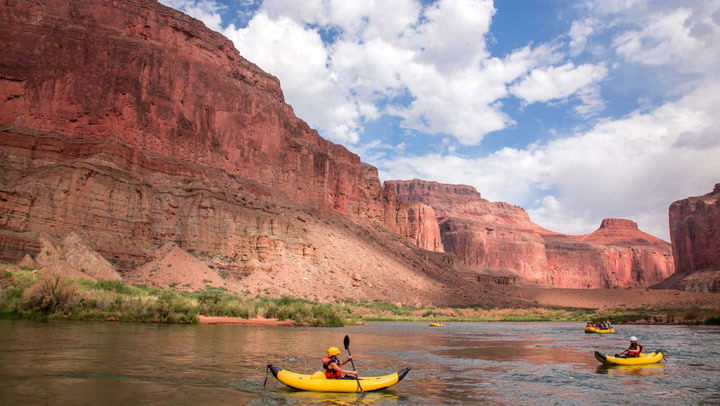Some of the most beautiful places in the U.S. are best seen from the water.
There’s something extra special about spending a day out on the water, letting it pull you where it wants. And it doesn’t matter whether you’re paddling around a calm coastal bay in Alaska or flying down a Class III rapid in Georgia — with the cool water below you, warm sun all around you, and an ever-changing landscape that might include red-rock canyon walls, lush overhangs, or even a pod of passing orca whales, the experience is bound to be wonderful.
There are hundreds of amazing kayaking trips across the U.S., but to help you narrow it down, we curated a list that offers a little something for everyone, from newbies looking for perfectly flat waters to advanced kayakers interested in careening down a Class IV rapid. Just make sure to secure the proper permit and practice good stewardship on whatever trip you choose. And don’t forget the proper apparel.
Glacier Bay National Park, Alaska
:max_bytes(150000):strip_icc():format(webp)/TAL-glacier-bay-national-park-USKAYAKTMOG0623-1289822b06794ca3839f3b82b1a91a11.jpg)
When it comes to pure, natural beauty, Alaska is hard to top. And that beauty is only enhanced from the water. While you won’t find any rapids or whitewater off the shores of Glacier Bay National Park, you will spot glaciers, puffins, sea lions, and even orca or humpback whales.
If you’re interested in visiting during the summer (a must), make sure to register for a free permit.
Colorado River, Arizona
:max_bytes(150000):strip_icc():format(webp)/colorado-river-arizona-grand-canyon-USKAYAK0521-0ae93099136e4a30acef86e64ba41009.jpg)
The great Colorado River traverses several states — Colorado, Utah, Arizona, and California — and while you could technically float the entire way, you’d need some serious paddling skills and a surefire plan to do so. To get a taste of the Colorado, head to Arizona and run the relatively mild 15-mile section of the river from Glen Canyon to Lees Ferry. And don’t forget to look up, so you get the full effect of the red-rock canyon walls and near-constant bluebird skies.
You don’t need a permit to float to Lees Ferry, but if you want to continue on, you’ll need to secure one.
Klamath River, California
:max_bytes(150000):strip_icc():format(webp)/klamath-river-california-USKAYAK0521-b91a51cfc2524876af99adac9f65b45f.jpg)
For a beginner-friendly river trip, check out Klamath River. The water may flow out of Oregon with gusto (Class IV water), but it mellows out in California. For a great family experience, put in at Happy Camp and enjoy the views on the 20-mile journey to Dillon Creek. Along the way, you’ll come across natural swimming holes, cliff-jumping spots, waterfalls, and some Class II and III rapids. Enjoy great waterfront camping and keep an eye on the skies above — bald eagles roam these parts.
A whitewater rafting permit is not required, but a fire permit is necessary.
Allagash Wilderness Waterway, Maine
:max_bytes(150000):strip_icc():format(webp)/allagash-wilderness-waterway-maine-USKAYAK0521-102e04f3396841cdb203dcdbede8a884.jpg)
If you have your heart set on an East Coast expedition, head to northern Maine. The Allagash Wilderness Waterway flows through an expansive, underdeveloped part of the state and boasts moose, bears, and blueberries along the way. For a full, multiday trip, put in at Churchill Dam and float till you reach Allagash Village, a section that has Class II rapids, lakes, and a short but mandatory portage around the Allagash Falls (well worth the effort).
You’ll need to register before you put in and be prepared to pay camping fees.
San Juan Islands, Washington
:max_bytes(150000):strip_icc():format(webp)/san-juan-islands-washington-USKAYAK0521-d40cf44ca60c440e894b9bec7e25fd67.jpg)
If sea life is what you seek, head to the San Juan Islands in Washington. Located near the U.S.-Canada border, this string of islands is home to orca whale pods all year round. Plus, it’s known for regular sightings of sea lions, seals, dolphins, and otters.
You can enjoy anything from a half-day to multiday kayaking trip around the islands, but we suggest giving yourself plenty of time to explore the smaller islands off Lopez Island, paddle through the protected waters around Orcas Island, and try your luck at spotting a resident orca pod off San Juan Island.
Chattooga River, Georgia
:max_bytes(150000):strip_icc():format(webp)/chattooga-river-georgia-USKAYAK0521-1a9cf5e205b74c91a31ffdcd558ed845.jpg)
Georgia’s Chattooga River has some Class V rapids, but most people plan out a more family-friendly trip that traverses Section 2 and 3 of the river. During Section 2, you’ll float over and around Class I and II rapids, enjoying calmer sections of the deep, crystal-clear water. After seven miles on Section 2, you can take out or continue on to the more difficult (and more remote) Section 3 — home to rapids that reach up to Class IV.
You can self-register for a permit to run the Chattooga River when you put in.
Middle Fork of the Salmon, Idaho
:max_bytes(150000):strip_icc():format(webp)/middle-fork-salmon-river-idaho-USKAYAK0521-556ce013f3d9429ebfdb5c48df392454.jpg)
If you’re up for more of a challenge, plan a kayaking trip down the Middle Fork of the Salmon — a journey found on almost every river lover’s bucket list. The river has some serious Class III and IV rapids, but it’s also known for its superior fly fishing, so make sure to cast a line when the water calms.
A permit is required to float the Middle Fork of the Salmon, and a lottery takes place during the busy summer months.




